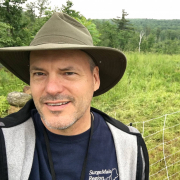The National Center for Appropriate Technology (NCAT) is teaming up with the Rocky Mountain Farmers Union to bring NCAT’s free Armed to Farm training to Colorado for the first time. Armed to Farm will take place August 29-September 2, 2022, in Boulder. Farmer-veterans will attend classroom sessions and travel to local farms for free hands-on learning experiences.
Armed to Farm trainings include an engaging blend of farm tours, hands-on activities, and interactive classroom instruction. NCAT Sustainable Agriculture specialists will lead the sessions. Staff from USDA agencies and experienced crop and livestock producers will provide additional instruction.
“We’re eager to bring Armed to Farm back to the West, and to train in Colorado for the first time,” said Armed to Farm Program Director Margo Hale. “Armed to Farm has served more than 900 veterans across the country as they start or grow their own sustainable farm business.”
Armed to Farm is a sustainable agriculture training program for military veterans. NCAT, a national nonprofit organization based in Butte, Montana, developed Armed to Farm in 2013 through a cooperative agreement with USDA-Rural Development. Farmer veterans learn how to make a business plan and market their products, how to access USDA programs, set business goals, and develop mentorships with seasoned farmers.
“Armed to Farm blew me away,” said Patrick Conrey, Armed to Farm alum and General Manager of the Oil Barn in Berthoud, Colorado. “Two years into my own agricultural business and I still reflect on the immersive experience as a highlight. The combination of in-field and in-class activities kept me engaged and paved the way. I would highly recommend the program to any veteran who is looking to turn their passion into a successful business.”
This training is for military veterans in the West. The number of participants will be limited. Spouses or farm partners are welcome to attend with a veteran but must submit a separate application.
Click HERE to apply by July 15. NCAT will notify selected participants by July 22.
NCAT and Rocky Mountain Farmers Union are partnering to host this Armed to Farm event. This work is supported by the USDA Natural Resources Conservations Service and the USDA Office of Partnerships and Public Engagement. Successful applicants may also receive a travel stipend thanks to our partnership with California-based Ranchin’ Vets.
Learn more about NCAT’s Armed to Farm and additional training series at ARMEDTOFARM.ORG.

 Virginia Kashdan is NCAT’s Chief Operating Officer. Before joining NCAT, Virginia was awarded the Science & Technology Policy Fellowship through the American Association for the Advancement of Science focusing on water quality at the U.S. Environmental Protection Agency – Office of Water in Washington D.C. After moving back to Montana, she became the director of the Lincoln County Asbestos Resource Program, supporting Operations & Maintenance activities on the Libby Asbestos Superfund Site. While in Libby, she volunteered on the Board of Directors for the Troy Farmers Market and became Secretary of the Board of Directors for the Libby Community Garden.
Virginia Kashdan is NCAT’s Chief Operating Officer. Before joining NCAT, Virginia was awarded the Science & Technology Policy Fellowship through the American Association for the Advancement of Science focusing on water quality at the U.S. Environmental Protection Agency – Office of Water in Washington D.C. After moving back to Montana, she became the director of the Lincoln County Asbestos Resource Program, supporting Operations & Maintenance activities on the Libby Asbestos Superfund Site. While in Libby, she volunteered on the Board of Directors for the Troy Farmers Market and became Secretary of the Board of Directors for the Libby Community Garden. Emilie Ritter Saunders is NCAT’s Communications Director. Emilie is an organizational leader with executive-level experience as a communicator, public policy advisor, and strategic planner. Her approach is driven by strategy, multimedia storytelling, data, and effective project management to amplify and elevate people, initiatives, and organizations. Previously, Emilie led communications and public affairs for the Montana Department of Commerce and Montana Office of Public Instruction. She spent a decade as a journalist with NPR member stations.
Emilie Ritter Saunders is NCAT’s Communications Director. Emilie is an organizational leader with executive-level experience as a communicator, public policy advisor, and strategic planner. Her approach is driven by strategy, multimedia storytelling, data, and effective project management to amplify and elevate people, initiatives, and organizations. Previously, Emilie led communications and public affairs for the Montana Department of Commerce and Montana Office of Public Instruction. She spent a decade as a journalist with NPR member stations. Michael Barth is NCAT’s Development Director. Michael joined NCAT in 2022, attracted by its programming and the education and training offered in agriculture, energy, and sustainability. He believes it is critically important to provide opportunities for all individuals to access the transformative power of education. Prior to joining NCAT, he spent 17 years in development and nonprofit management with the Montana Technological University Foundation. He is experienced in prospect research, project and event management, planned giving, and fundraising systems and software. Michael is a Certified Fund Raising Executive and completed the Nonprofit Executive Leadership Program at the Lilly School of Philanthropy.
Michael Barth is NCAT’s Development Director. Michael joined NCAT in 2022, attracted by its programming and the education and training offered in agriculture, energy, and sustainability. He believes it is critically important to provide opportunities for all individuals to access the transformative power of education. Prior to joining NCAT, he spent 17 years in development and nonprofit management with the Montana Technological University Foundation. He is experienced in prospect research, project and event management, planned giving, and fundraising systems and software. Michael is a Certified Fund Raising Executive and completed the Nonprofit Executive Leadership Program at the Lilly School of Philanthropy. Nina Prater has been with the National Center for Appropriate Technology (NCAT) since 2016 as a Soil Specialist and Outreach Coordinator in the Southeast Regional Office. She strives to help farmers understand soils as a living entity so that they are able to farm profitably and build healthy soils for long-term success. Nina also works closely with the Gulf States Regional Office staff to coordinate outreach efforts in that region. Nina served as an Energy Corps member in 2013 and worked for her local conservation district for 2.5 years before joining NCAT. Nina and her husband Jeremy own and operate a small sustainable livestock operation in the Ozarks hills of Arkansas, where they raise meat goats, cattle, hogs, and poultry. They utilize adaptive grazing methods to build soil health in their pastures.
Nina Prater has been with the National Center for Appropriate Technology (NCAT) since 2016 as a Soil Specialist and Outreach Coordinator in the Southeast Regional Office. She strives to help farmers understand soils as a living entity so that they are able to farm profitably and build healthy soils for long-term success. Nina also works closely with the Gulf States Regional Office staff to coordinate outreach efforts in that region. Nina served as an Energy Corps member in 2013 and worked for her local conservation district for 2.5 years before joining NCAT. Nina and her husband Jeremy own and operate a small sustainable livestock operation in the Ozarks hills of Arkansas, where they raise meat goats, cattle, hogs, and poultry. They utilize adaptive grazing methods to build soil health in their pastures. Lee Rinehart is a graduate of Texas A&M University, where he studied animal science and agricultural education. He currently works as an agriculture specialist in the National Center for Appropriate Technology’s Northeast Regional Office, where he focuses on pasture and rangeland ecology and grazing systems. He has served as county Extension agent in Texas and Montana, organic farm educator in Pennsylvania, and cattle ranch manager in central Texas. His specialty is developing grazing plans and assisting producers in using animals to renovate pastureland. Lee is a Chief Petty Officer in the Navy Reserve and spends his free time biking, sailing, and renovating his 1925 Cape Cod house in Northeast Pennsylvania.
Lee Rinehart is a graduate of Texas A&M University, where he studied animal science and agricultural education. He currently works as an agriculture specialist in the National Center for Appropriate Technology’s Northeast Regional Office, where he focuses on pasture and rangeland ecology and grazing systems. He has served as county Extension agent in Texas and Montana, organic farm educator in Pennsylvania, and cattle ranch manager in central Texas. His specialty is developing grazing plans and assisting producers in using animals to renovate pastureland. Lee is a Chief Petty Officer in the Navy Reserve and spends his free time biking, sailing, and renovating his 1925 Cape Cod house in Northeast Pennsylvania.